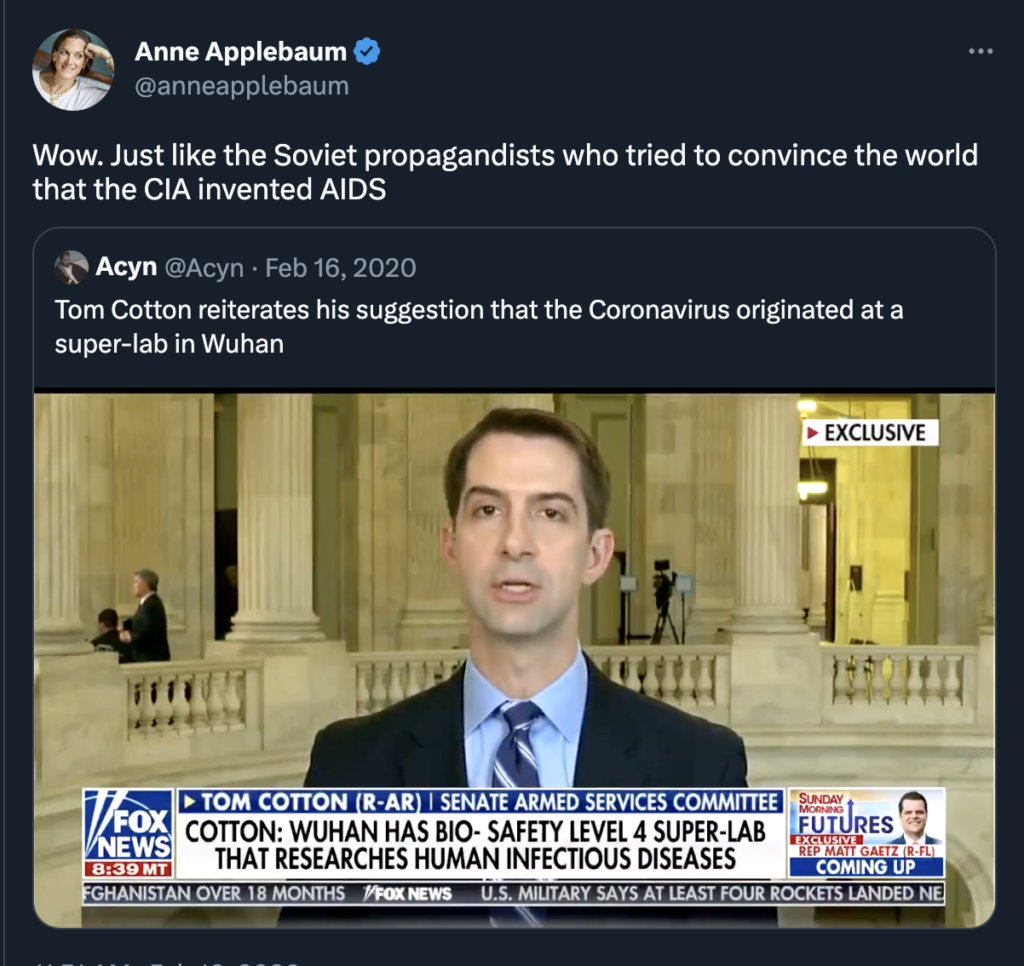Global Disinformation Index, Inform Thyself
Global Disinformation Index, Inform Thyself
Time and time again, so-called disinformation watchdogs fail their own tests—the lab leak is just the latest example.

Misinformation (Brian McGowan / Unsplash)
The Global Disinformation Index (GDI)—a British nonprofit that smearedReason as an unsafe news website using dubious criteria—might want to take a closer look at newly uncovered disinformation being spread by… the website of the Global Disinformation Index.
GDI is partly funded by the U.S. State Department, and seeks to discourage advertisers from working with news outlets like Reason on the theory that we misinform our readers. (NewsGuard, a more transparent advising organization, rates Reason 100 out of 100 "for the highest adherence to journalistic practice.") It has recently come under considerable criticism from conservative and libertarian news websites following the publication of an expose in The Washington Examiner.
GDI earned itself additional criticism this week, after the U.S. Energy Department endorsed the lab leak theory of COVID-19's origins. Previous reports by GDI warned advertisers to blacklist news sites that attempted to blame the pandemic on a lab leak, and implied that any website asserting a cover-up on the part of the Chinese government was promoting racist disinformation with the capacity of harming Asian people. GDI's messaging on the lab leak theory was clear and consistent: News websites that explored this topic should be demonetized. According to The Examiner's Gabe Kaminsky:
GDI alleged in a February 2020 report dubbed "Coronavirus: The makings of a disinformation pandemic?" that "adversarial narratives" are emerging as a key "disinformation tactic." The report called out Sen. Tom Cotton (R-AR) for raising the possibility on Fox News that COVID-19 came from a lab.
"By broadcasting the Senator's words to a national audience, this debunked conspiracy theory is given authority, validation and amplification," said GDI in the report.
One month later, in March 2020, GDI released a report titled, "Why is Ad Tech Funding These Ads on Coronavirus Conspiracy Sites?"
The report, which slammed Google and other companies for "providing ad revenue streams to known disinformation sites peddling coronavirus conspiracies," called out the conservative blog American Thinker for publishing a commentary article titled "The Wuhan Virus Escaped From a Chinese Lab." GDI also took aim at a company selling N-95 masks for advertising in the article.
Portraying the lab leak notion as a dangerous, racist conspiracy theory never made any sense, and journalists, health officials, and disinformation trackers—like GDI—that enforced this narrative should feel profoundly embarrassed.
But that's not all GDI has to atone for.
On Monday, I called out several of the journalists who incorrectly smeared lab leak origin proponents as racists—The New York Times' lead coronavirus reporter, Apoorva Mandavilli, chief among them.
Another journalist who penned an unfortunate tweet about the lab leak theory is The Atlantic's Anne Applebaum, who likened Sen. Tom Cotton (R–Ark.) to a "Soviet propagandist" for merely raising the possibility that COVID-19 escaped from a Chinese laboratory.

Applebaum has previously produced some excellent work. She has authored two books on the horrors of Soviet communism: Gulag: A History, on Soviet prisons, and Red Famine: Stalin's War on Ukraine, about the Holodomor. But she erred when she described the lab leak theory as akin to Russian disinformation.
Notably, Applebaum was also listed on the GDI's website as one of its principle journalistic advisors. Given GDI's misguided approach to the lab leak theory, I wondered if Applebaum was partly responsible—or whether she would now advise GDI to change course. So I emailed her.
Her response was surprising, to say the least.
"Until a few days ago I was not aware that I was listed as an advisor on the GDI website," writes Applebaum. "I last spoke to them when they were still raising money—probably 2018 or 2019—and have not advised them on anything or had any contact since. I have asked to have my name taken off their website, which they agreed to do."
GDI misrepresenting Applebaum as a member of its advisory panel is especially hypocritical, given the organization's stated reasons for placing Reason on its list of "ten riskiest online news outlets." GDI dinged Reason for not displaying "information regarding authorship attribution, pre-publication fact-checking, or post-publication corrections processes." It is not clear exactly what the organization meant by this; GDI did not respond to a request for comment.
But GDI's own website has clearly committed a transgression that sounds remarkably similar: It listed an advisor who actually had nothing to do with the organization, and nowhere on GDI's website does it currently explain the mistake. There is no statement along the lines of, Anne Applebaum was erroneously listed as an advisor to GDI and we regret the error. It seems like GDI lacks clarity regarding its own authorship attribution and fact-checking processes.
Time and time again, so-called disinformation watchdogs fail their own tests, but this is a particularly galling example. The State Department has no business funding such sanctimony.




Post a Comment